Photo: Ron Wolfson/Michael Ochs Archives/Getty Images
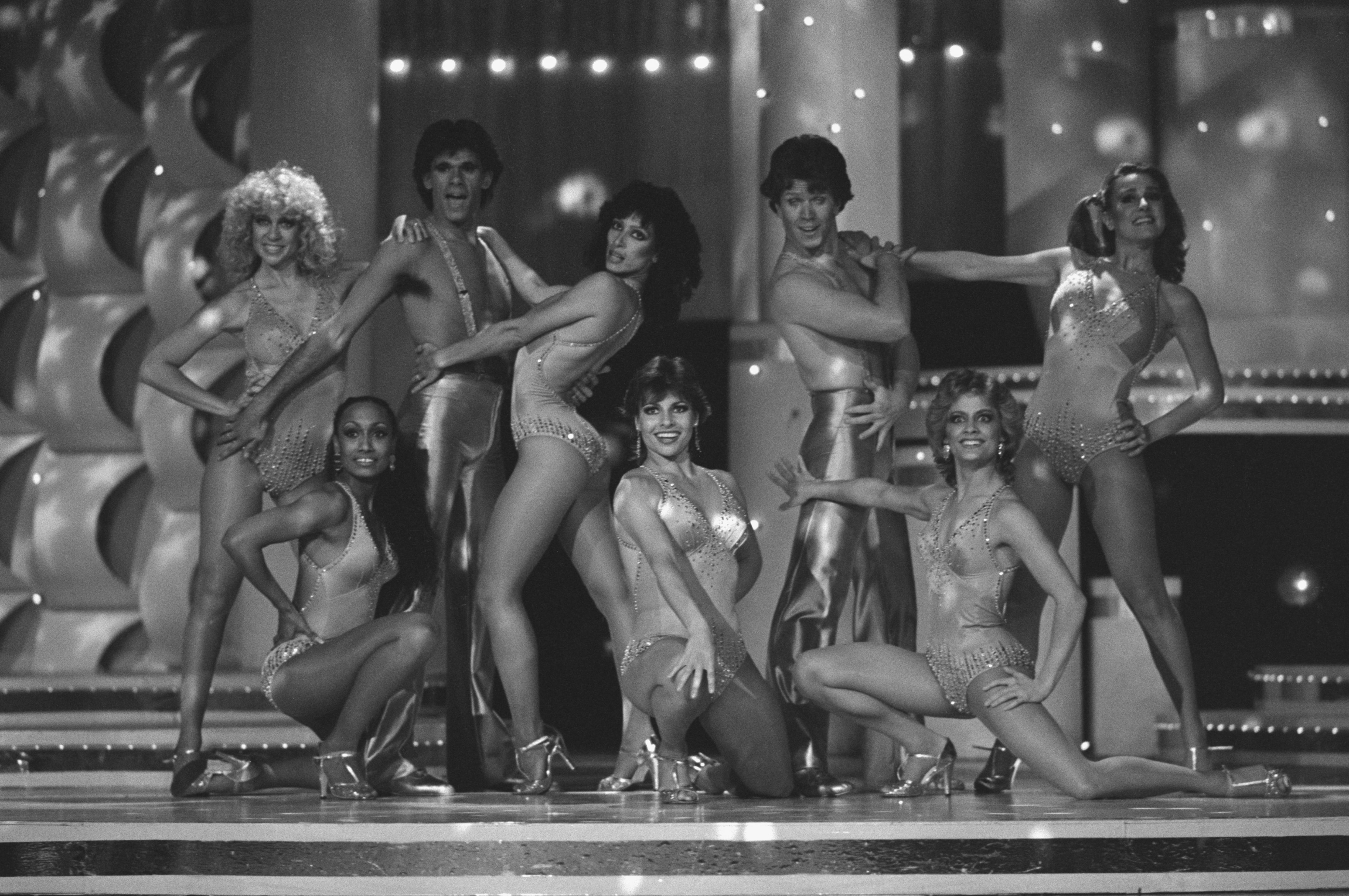
The Solid Gold Dancers in 1982
news
Explore "Solid Gold," The Epic '80s Hit Music TV Show | History Of
The third-ever episode of GRAMMY.com's History Of video series tells the story of a glitzy music show that featured the biggest artists of the moment, backed by the fabulous Solid Gold Dancers
"Welcome to 'Solid Gold!' Starting right now and for every week to come, we're gonna bring you the biggest hit records in the country, some by the people that made them famous. So get ready for a lot of comedy, some real hot dancing and many surprises," host Dionne Warwick said during its debut episode on Sept. 15, 1980. The GRAMMY-winning singer hosted the entire first season, after which would go on to be hosted by Andy Gibb, comedian Arsenio Hall and others for the remaining seven seasons.
We celebrate the 40th anniversary of the launch of the shimmering '80s music TV show in our third-ever episode of the one-minute History Of video series, which you can watch below.
Learn About The U.S.' First Integrated Nightclub In 60 Seconds | The History Of
During that lively first show, Irene Cara performed (most numbers were lip-synched) her GRAMMY-nominated hit "Fame" and Chuck Berry rocked the crowd with a live rendition of "Johnny B Goode," both backed by the amazing in-house dance squad known as the Solid Gold Dancers. To add excitement to the countdown of the week's top hits, the crew served up energetic choreography for each song.
Other legendary musical guests included GRAMMY winners Rolling Stones, Bon Jovi, James Brown, Madonna, the Pointer Sisters and Rod Stewart, as well as Hall & Oates, a-ha and many others.
<style>.embed-container { position: relative; padding-bottom: 56.25%; height: 0; overflow: hidden; max-width: 100%; } .embed-container iframe, .embed-container object, .embed-container embed { position: absolute; top: 0; left: 0; width: 100%; height: 100%; }</style><div class='embed-container'><iframe src='https://www.youtube.com/embed//ltSpd7Rh_sM' frameborder='0' allowfullscreen></iframe></div>
Gladys Knight & Patti LaBelle's Verzuz Faceoff Was A Moment Of Pure Soul Sisterhood

Photo: Ebru Yildiz
interview
X's Mark The Spot: How Cigarettes After Sex Turn Difficult Memories Into Dreamy Nostalgia
"We’re all in the same boat," Greg Gonzalez says of the band’s new album, ‘X’s.' The frontman speaks with GRAMMY.com about how channeling Madonna and Marvin Gaye helped him turn his memories of a relationship into sublime dream pop.
When Greg Gonzalez sat down to start writing the next Cigarettes After Sex album, the dream pop frontman relied equally on memories of heartbreak and the ballads of the Material Girl. "‘90s Madonna was a big influence on this record," he tells GRAMMY.com with a soft smile.
Though the end result won’t be mistaken for anything off of Ray of Light, that timeless, almost mystic cloud of emotionally resonant pop carries a distinct familiarity on Cigarettes After Sex's new album, X’s.
Cigarettes After Sex has championed that sweet and sour dreaminess since their 2017 debut. Two years after that self-titled record earned rave reviews and was certified gold, the El Paso, Texas-based outfit reached even deeper for Cry. And while those records cataloged Gonzalez's heartbreaks and intimacies in sensual detail, Gonzalez knew he could reach deeper on the band’s third LP: "These songs are just exactly as memory happened."
Arriving July 12, X’s fuses Cigarettes After Sex's dream pop strengths with ‘90s pop warmth and ‘70s dance floor glow. Always one to bring listeners into the moment, Gonzalez imbues the record with a lyrical specificity that gives the taste of pink lemonade and the tension of a deteriorating relationship equal weight. On X’s, the listener can feel the immediate joy and lingering pain in equal measure.
"This is specific to me and what I'm going through, but then I go out and talk to people on tour, and they’re like, 'Oh, yeah, I went through the exact same thing,'" Gonzalez says.
Leading up to the release of X’s, Gonzalez spoke with GRAMMY.com about the appeal of ‘90s Madonna, finding a way to dance through tears, and his potential future in film scoring.
Tell me about the production process for this record. You've always been able to build nostalgic landscapes, but this record feels smoother than before. Were there any new touchpoints you were working with?
That was the thing: trying to make the grooves tighter. It was coming from more of a ‘70s Marvin Gaye kind of place, trying to make it groove like a ‘70s dance floor.
Which is an especially interesting place to be writing from when dealing with that line between love and lust.
Yeah. The stuff we've done before was really based on the late ‘50s, early ‘60s slow dance music. But it was always supposed to be dance music; I always wanted Cigarettes to be music you could dance to, even if it was a slow dance.
When I think of pop music and I think of songs that really feel powerful, they usually make you want to groove in some way. I love a lot of music that doesn't do that: ambient music or classical or some jazz. But there's so much power to music that makes you want to move. And I found throughout the years that I could just never get enough of the music that makes you want to dance. So I thought, Okay, the music that I make should be really emotional. It should feel like music you could actually cry to, but in the end it should make you want to also move in that way.
It’s the physical necessity of the music, some forward motion to match the emotional journey. I’d imagine that is related in some sense to the fact that you’re writing in a somewhat autobiographical way. Is that a way of not getting stuck in the stories, in the feelings?
I'm writing it for myself. Of course, I can't help but picture the audience in some way. But it's never like I'm writing it for them.
There is an audience that I can visualize that would like the music. [Laughs]. There have been times where we’re recording and I close my eyes to visualize an arena or a stadium to picture the music in that setting. It’s a nice feeling. And that's just based on the music that I love that I thought had similarities.
Is there any particular music that you love that fills that feeling?
There's so much music that I was obsessed with, but with Cigarettes I narrowed it down. Since I was a kid, I did every kind of style I could do. I was in power pop bands, new wave, electro, metal, really experimental bands.
But when I finally sat down and said, "Let me make an identity for Cigarettes and make it special," I had to think about what my favorite music was and what music affected me the deepest. And it was stuff like "Blue Light" by Mazzy Star or "Harvest Moon" by Neil Young or "I Love How You Love Me" by the Paris Sisters. And I kind of put all that together and that became the sound of Cigarettes. And now I do that every time I make a record: I'll make a playlist of what I want it to feel like. I mentioned Marvin Gaye. I feel like ‘90s Madonna was a big influence on this record.
Madonna in the ‘90s? No one could touch that era. I don't know when the last time you listened to that music was, but…
No, I grew up with Madonna and I used to watch the "Like A Prayer" video on repeat. It blew me away. But then I came back and I got into the ‘90s stuff, like "Take A Bow" and that record Something To Remember. It's all of the slower tunes. And that was a big influence, especially songs like "Rain."
You clearly have a diverse musical appetite, but you’ve also highlighted people with such identifiable voices — something that I think is true for Cigarettes as well. Your vocals are so front and center in the identity of the project.
That's great. The singer pretty much makes the song for me, whatever I’m listening to. The entire spirit comes down to the vocals. I'll hear a song like "Take A Bow" and be like, This feels so special. What if I made something that felt like this? If I told someone this [record] was based on Marvin Gaye and ‘90s Madonna, I don’t know if they would think it really sounded like that. It's more just trying to capture the spirit of what those records feel like.
That's what's cool about it too: You can remember those songs that were filling the air back in the ‘90s and what those feelings were, what you were up to, and draw a line between that and whatever's happening now that I wrote about.
You don’t seem like the type of person to avoid negative feelings when you come up against them in that process either. The songs feel like you just embrace it, even if it's really painful.
I've always felt that's the best way for me to go through things, to face it head on. It's supposed to be painful. You have all these really great moments with somebody and all these great memories, and then when it ends, honestly, that's the way it goes, right? That's the trade off.
Yeah, but not everybody goes through a breakup and then makes an album about it. Isn’t that like returning to the scene of the crime? How does it feel to deal with it in that way?
That's funny. The thing was, I was writing a lot of this stuff while I was still in a relationship. It took so long to finish it.
Finish the album or finish the relationship? [Laughs.]
Actually both. But yeah, the record is mostly about that one relationship, but there are little diversions with some of the songs. A lot of the key images and songs are based on that romance and little memories that I took from it.
I like that I have all those moments kind of set in stone. It’s hard to listen to this record too because I'll just really see these moments, all these memories, and it can be a bit much to flash back to all that stuff and see it so vividly. But I love that I have it. Those memories meant so much and I’m glad that they're collected and displayed in this way.
And you were able to collect them when it was happening as opposed to having some time between, which could warp those memories. Writing and recording when you’re as raw as possible makes sense, so what you capture is really honest.
That's why I like to write these songs that are as honest as possible or as autobiographical as possible, with a lot of details. If I'm writing a song and someone heard it, they would know it was about them just based on all the imagery that's in that song. It's like a little letter to them. It could be like a secret little letter to someone.
That makes me think of "Holding You, Holding Me," which is so lovely and feels as immediate as anything you’ve done.
It was the pandemic, and then the other girlfriend I had at that time, we were living in downtown L.A. and just wanted to get out of the house and stay somewhere nicer for a while. And we went to this AirBnb that was in Beverly Hills with this beautiful backyard. The song was meant to be kind of Fleetwood Mac-ish, like "Gypsy" or "Sara", that nice ‘70s country pop feel.
Over the years I’ve noticed you frequently use taste as a sensory link in your songs, which really creates an evocative moment — I’m thinking about references to candy bars and lemonade on this album. What is it about that sense that sticks out to you?
If I'm going back to memory, then that's just what really happened. We went to the store to go buy wine and candy because that was the vibe that night. "Let’s watch movies and get red wine and some candy bars." And it was just a big memory that we walked outside and it started raining. I think too, what's nice about using objects is that it gives you so much mood in a song. You can tell what the feeling is of that moment when you put those things together.
And it can have an almost universal understanding. People will understand what it means to have a "candy bar night."
That's the craziest thing. It's almost like you're trained to write universally, meaning generically. Like, "Oh, this is a song that everyone can like and the lyrics can be really simple." But I’ve found that the songs that are really detailed and were more personal stories, a song like "K." from Cigarettes After Sex, those are the songs that everyone really loves, the ones that take up being really specific.
I suppose that's pop's way of being a doorway. When you're talking about your personal experiences, somebody is going to enter into it and feel like you're singing about theirs.
You realize that we're all in the same boat. This is specific to me and what I'm going through, but then I go out and talk to people on tour, and they’re like, "Oh, yeah, I went through the exact same thing." I feel very lucky that most people I talk to that love [our] music are always saying that. It’s so special.
It makes me trust my instincts. That's the hard thing when you're writing. You're wondering, Is this too much to disclose? Is this too much information? [Laughs.] That instinct is really important to know, to trust it. That's the tough one. That's what's also therapeutic about it too. You want to share things that feel really personal because then you can process them. You can really start to unpack what those moments meant and what they can mean going forward. It gives me more confidence when I hear that kind of stuff from people.
What then is it like when you sing it for a crowd? You’re performing, but you can’t fully separate the emotion that inspired that song.
That's tough because, ideally, if I did my job well enough writing the song, then it should be hard to sing live — especially if I really see those moments when I'm singing it. It could bring me to tears, honestly, because it should feel that intense. And it's even worse if I look in the crowd and someone's crying. I can't even look at them. And that happens very often. If I started crying, my voice will stop.
That brings a real cinematic feeling to your music too, which makes me think you’d be good at scoring a film. Is that something you’d tackle?
I'm definitely obsessed with film and have been since I was a kid. The idea that I keep saying — and I almost feel like I'm going to jinx it because I keep saying it too much — is that I really want to direct and write something. And I've written some ideas down for screenplays and things. It seems like it's hard to transition from musician to filmmaker and really make it stick. But that would be something I want to do in the next 10 years. I'm giving myself 10 years. [Laughs.]
Latest News & Exclusive Videos

5 Artists Who Graduated From GRAMMY Camp: Chappell Roan, Maren Morris, Blu DeTiger & More
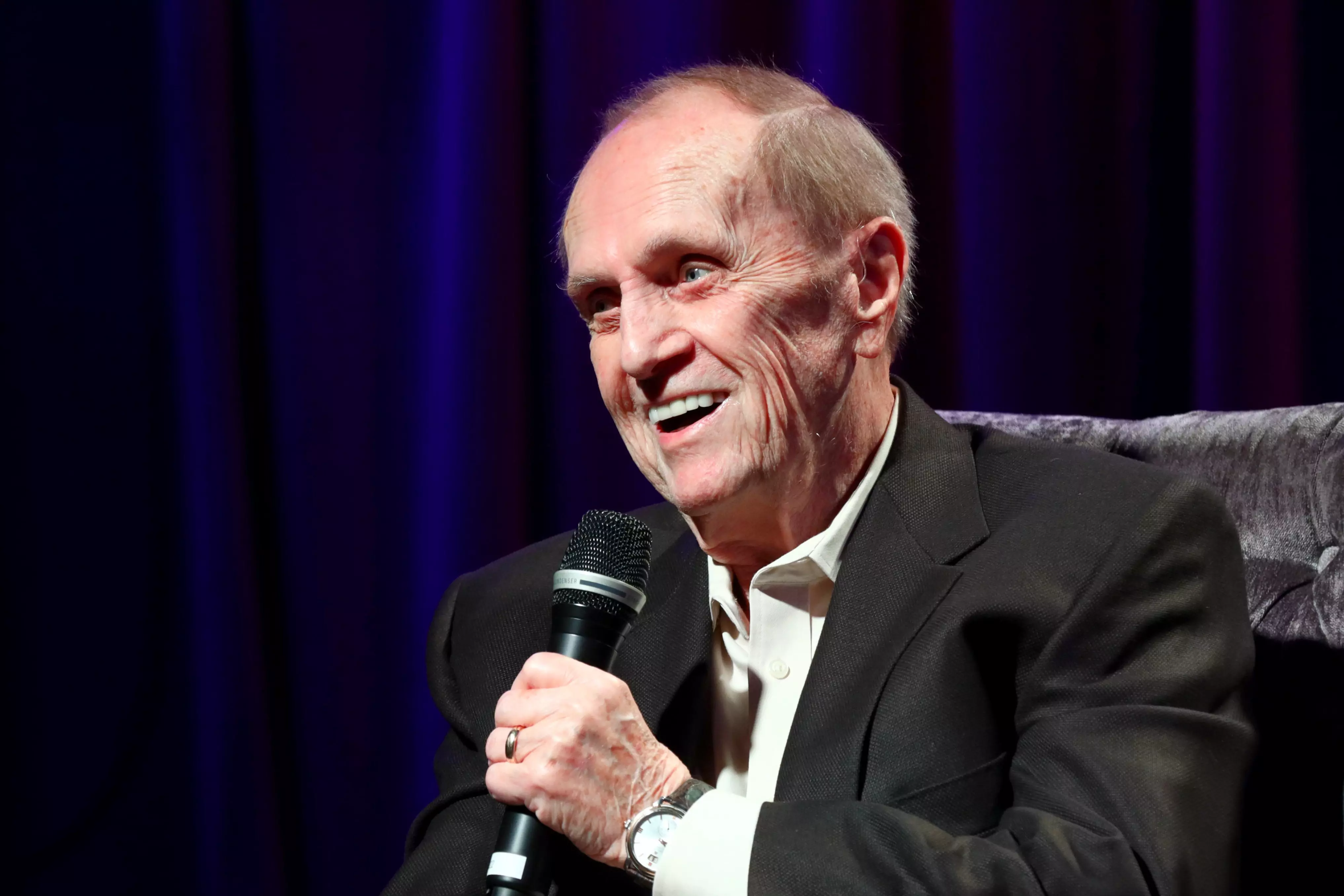
Remembering Bob Newhart, The Comic Who Made GRAMMY History With His Debut Album
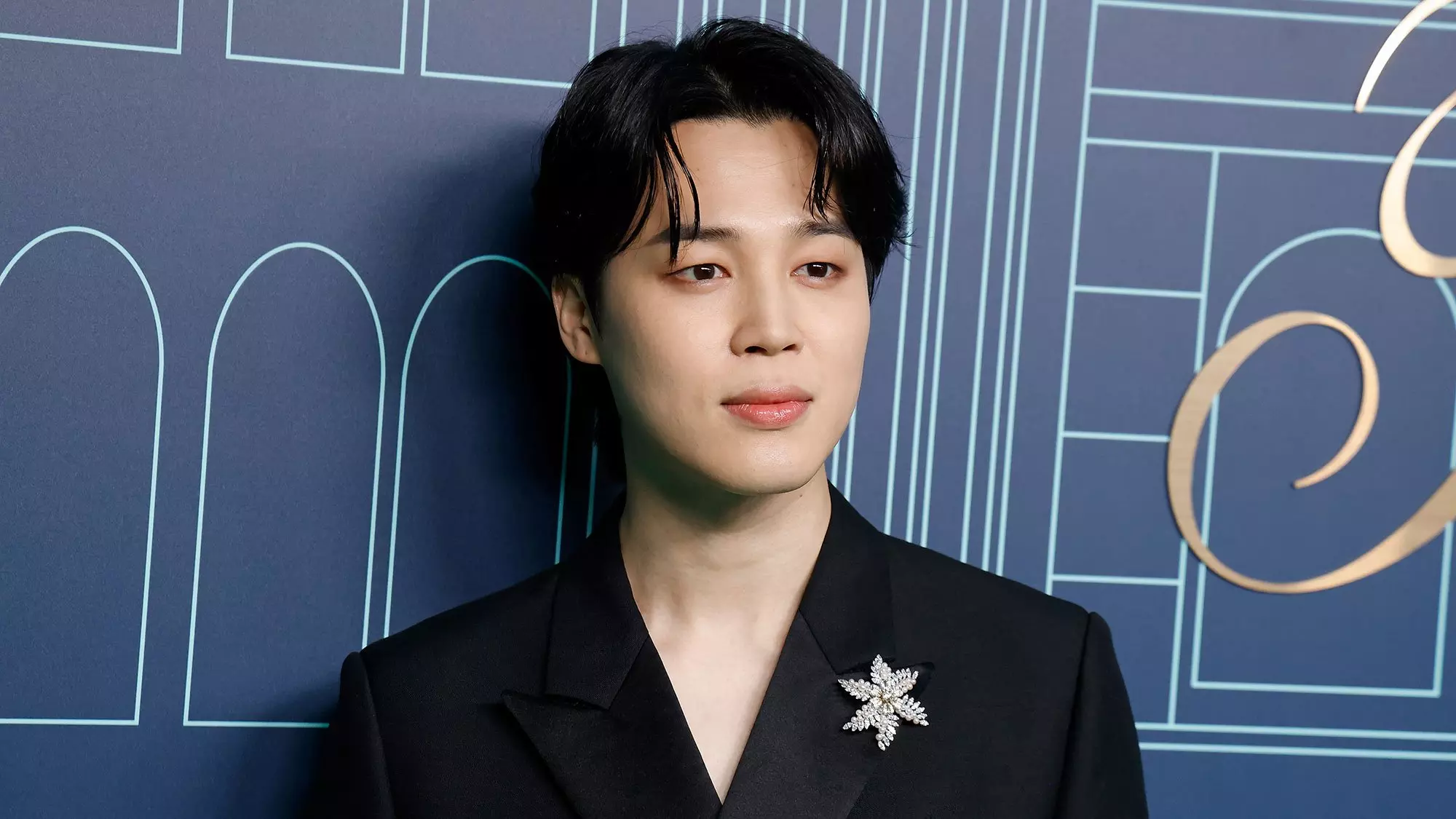
5 Takeaways from BTS Jimin's New Album, 'MUSE': A Bold Exploration Of Love And Inspiration

Ladies And Gentlemen, Glass Animals Are Floating In Space

Watch Stevie Wonder Win Album Of The Year
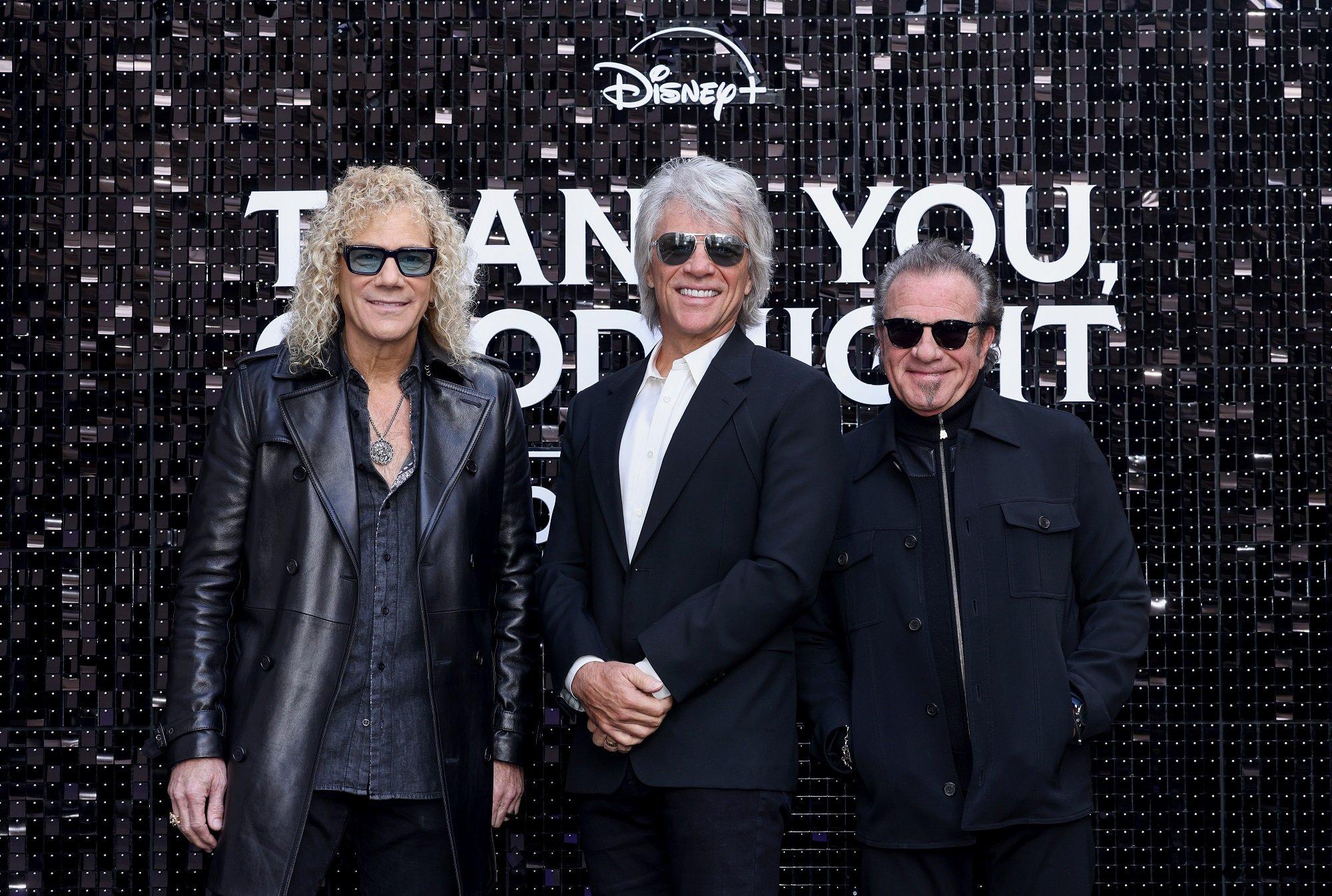
Photo: Tim P. Whitby/Getty Images for Disney+
list
10 Facts About Jon Bon Jovi: A Friendship With Springsteen, Philanthropy, Football Fanaticism & More
Ahead of the band's new album 'Forever,' out June 7, and a new Hulu documentary, "Thank you, Goodnight: The Bon Jovi Story," read on for 10 facts about the GRAMMY-winning group and its MusiCares Person Of The Year frontman.
Bon Jovi have officially been in the cultural conversation for five decades — and it looks like we'll never say goodbye.
The band's self-titled debut album was unleashed upon the world in 1984, and lead single "Runaway" made some waves. Yet the New Jersey group didn't truly break through until their third album, the 12 million-selling Slippery When Wet. By the late 1980s, they were arguably the biggest rock band in the world, selling out massive shows in arenas and stadiums.
Since, Bon Jovi releases have consistently topped album charts (six of their studio albums hit No. 1). A big reason for their continued success is that, unlike a majority of their ‘80s peers, frontman Jon Bon Jovi made sure that they adapted to changing times while retaining the spirit of their music — from the anthemic stomp of 1986’s "Bad Medicine" to the Nashville crossover of 2005’s "Who Says You Can’t Go Home." It also doesn’t hurt that the 2024 MusiCares Person Of The Year has aged very gracefully; his winning smile and charismatic personality ever crush-worthy.
Their fifth decade rocking the planet has been marked by many other milestones: The release of a four-part Hulu documentary, "Thank you, Goodnight: The Bon Jovi Story"; Bon Jovi's 16th studio album Forever, and fan hopes for the return of original guitarist Richie Sambora who left unexpectedly in 2013. Despite all of these positive notes, there is an ominous cloud hanging over the group as their singer had to undergo vocal surgery following disappointing, consistently off-key performances on the group's 2022 U.S. tour. Even afterward, he remains unsure whether he’ll be able to tour again. But Bon Jovi remains popular and with Sambora expressing interest in a reunion, it's plausible that we could see them back on stage again somehow.
Jon Bon Jovi has also had quite a multifaceted career spun off of his success in music, as shown by the following collection of fascinating facts.
Jon Bon Jovi Sung With Bruce Springsteen When He Was 17
By the time he was in high school, Jon Bongiovi (his original, pre-fame last name) was already fronting his first serious group. The Atlantic City Expressway was a 10-piece with a horn section that performed well-known tunes from Jersey acts like Bruce Springsteen and Southside Johnny and the Asbury Jukes.
They regularly played The Fast Lane, and one night Bruce Springsteen was in the audience. To Bon Jovi’s surprise, The Boss jumped onstage to join them. The two later became good friends — during his MusiCares performance, Bon Jovi introduced Springsteen as "my mentor, my friend, my brother, my hero."
Jon Recorded Bon Jovi’s First Hit Before The Band Formed
Although "Runaway" was the debut single and lone Top 40 hit from Bon Jovi's first two albums, it was recorded as a professional demo back in 1982.
Bon Jovi got a gig as a gopher at Power Station, the famed studio co-owned by his second cousin Tony Bongiovi where artists like the Rolling Stones, Diana Ross, and David Bowie recorded. (He watched even watched Bowie and Freddie Mercury record the vocals for "Under Pressure.")
The future rockstar cut "Runaway" (which was co-written mainly by George Karak) and other demos with session musicians — his friend, guitarist Aldo Nova, Rick Springfield/John Waite guitarist Tim Pierce, Springsteen keyboardist Roy Bittan, bassist Hugh McDonald (a future Bon Jovi member), and Scandal drummer Frankie LaRocca. The song first appeared on a WAPP compilation under his name, but then it was placed on Bon Jovi’s debut album. When the video for "Runway" was created nearly two years later, members of Bon Jovi were miming to other people’s performances.
Although it is a classic, original guitarist Richie Sambora hates it and never wants to play it again.
He Eloped With His High School Sweetheart In April 1989
During the band’s world tour in support of New Jersey, Bon Jovi and Dorothea Hurley spontaneously eloped in a quickie wedding in Vegas. His bandmates and management were shocked to find this out; the latter probably feared that his ineligible bachelor status would harm their popularity with their ardent female fans. But it simply played more into his more wholesome image that differed from other hard rockers of the time.
In May 2024, Bon Jovi’s son Jake secretly married "Stranger Things" actor Millie Bobby Brown. It was like history repeating itself, except this time family was involved.
Listen: Revisit Jon Bon Jovi's Greatest Hits & Deep Cuts Ahead Of MusiCares' Person Of The Year 2024 Gala
The Bongiovi Family Is Part Of The Bon Jovi Family
Back in the ‘80s, parents often didn’t like their kids’ music. However, Bon Jovi’s parents completely supported his. Mother Carol Bongiovi often chaperoned his early days when he was an underaged kid playing local clubs and bars in New Jersey. Father Jon Sr. was the group’s hair stylist until their third album, Slippery When Wet. He created his son's signature mane.
Jon’s brother Matthew started as a production assistant in the band’s organization, then worked for their management before becoming his brother’s head of security and now his tour manager. His other brother Anthony became the director of a few Bon Jovi concert films and promo clips. He’s also directed concert films for Slayer and the Goo Goo Dolls.
Bon Jovi Is A Regular In Television & Film
After writing songs for the Golden Globe-winning "Young Guns II soundtrack (released as the solo album Blaze Of Glory) and getting a cameo in the Western’s opening, Bon Jovi was bitten by the acting bug. He studied with acclaimed acting coach Harold Guskin in the early ‘90s, then appeared as the romantic interest of Elizabeth Perkins in 1995's Moonlight and Valentino.
In other movies, Bon Jovi played a bartender who’s a recovering alcoholic (Little City), an ex-con turning over a new leaf (Row Your Boat), a failed father figure (Pay It Forward), a suburban dad and pot smoker (Homegrown), and a Navy Lieutenant in WWII (U-571). The band’s revival in 2000 slowed his acting aspirations, but he appeared for 10 episodes of "Ally McBeal," playing her love interest in 2002.
Elsewhere on the silver screen, the singer has also portrayed a vampire hunter (Vampiros: Los Muertos), a duplicitous professor (Cry Wolf), the owner of a women’s hockey team (Pucked), and a rock star willing to cancel a tour for the woman he loves (New Year’s Eve). He hasn’t acted since 2011, but who knows when he might make a guest appearance?
Jon Bon Jovi Once Co-Owned A Football Team
In 2004, Bon Jovi became one of the co-founders and co-majority owner of the Philadelphia Soul, which were part of the Arena Football League (AFL). (Sambora was a minority shareholder.) The team name emerged in a satirical scene from "It’s Always Sunny In Philadelphia" during which Danny DeVito’s character tries to buy the team for a paltry sum and twice butchers the singer’s name.
Jon stuck with the team until 2009, a year after they won Arena Bowl XXII, defeating the San Jose SaberCats. He then set his eyes on a bigger prize, the Buffalo Bills, aligning himself with a group of Toronto investors in 2011. One of his biggest competitors? Donald Trump, who ran a smear campaign alleging that the famed singer would move the team to Toronto.
In the end, neither man purchased the team as they were outbid by Terry and Kim Pegula, who still own the Bills today.
Jon & Richie Sambora Wrote Songs For Other Artists
Having cranked out massive hits with songwriter Desmond Child, Bon Jovi and Sambora decided to write or co-write songs for and with other artists.
In 1987, they co-wrote and produced the Top 20 hit "We All Sleep Alone" with Child for Cher, and also co-wrote the Top 40 hit "Notorious" with members of Loverboy. In 1989, the duo paired up again Loverboy guitarist Paul Dean for his solo rocker "Under The Gun" and bequeathed the New Jersey outtake "Does Anybody Really Fall in Love Anymore?" (co-written with Child and Diane Warren) to Cher.
The Bon Jovi/Sambora song "Peace In Our Time" was recorded by Russian rockers Gorky Park. In 1990, Paul Young snagged the New Jersey leftover "Now and Forever," while the duo penned "If You Were in My Shoes" with Young, though neither song was released. In 2009, Bon Jovi and Sambora were inducted into the Songwriters Hall of Fame for their contributions to music.
Jon Bon Jovi Once Ran His Own Record Label
For a brief time in 1991, he ran his own record label, Jambco, which was distributed through Bon Jovi’s label PolyGram Records. The only two artists he signed were Aldo Nova and Billy Falcon, a veteran singer/songwriter who became Bon Jovi's songwriting partner in the 2000s. Neither of their albums (Aldo Nova’s Blood On The Bricks and Billy Falcon’s Pretty Blue World) were big sellers, and the label folded quickly when they began losing money.
Still, the experience gave Bon Jovi the chance to learn about the music business. That experience helped after he fired original manager Doc McGhee in 1991 and took over his band’s managerial reins until 2015.
Bon Jovi's Vocal Issues Aren't New
Although Jon Bon Jovi's vocal problems have become a major issue recently, they stem back to the late 1980s. It's doubtful as to whether Jon had proper vocal training for a rock band at the start.
The group did 15-month tours to support both the Slippery When Wet and New Jersey albums. Near the end of the grueling Slippery tour, Bon Jovi was getting steroid injections because his voice was suffering.
While his voice held up into the 2000s, it has become apparent over the last decade that his singing is rougher than it used to be. As shown in the Hulu new documentary, the singer has been struggling to maintain his voice. It’s natural for older rock singers to lose some range — it’s been very rare to hear him sing any of the high notes in "Livin’ On A Prayer" over the last 20 years — but he admitshe is unsure whether he can ever tour again, even with recent surgery.
Bon Jovi Has Been A Philanthropist For Over Three Decades
Back in the 1980s, the upbeat Bon Jovi made it clear that they were not going to be a toned-down political band. But in the ‘90s, he and the band toned down their look, evolved their sound, and offered a more mature outlook on life.
Reflecting this evolved viewpoint, the band started an annual tradition of playing a December concert in New Jersey to raise money for various charitable causes; the concert series began in 1991 and continued with the band or Jon solo through at least 2015. The group have played various charitable concert events over the years including the Twin Towers Relief Benefit, Live 8 in Philadelphia, and The Concert For Sandy Relief.
By the late 2000s, Jon and Dorothea founded the JBJ Soul Kitchen to serve meals at lower costs to people who cannot afford them. COVID-19 related food shortages led the couple to found the JBJ Soul Kitchen Food Bank. Their JBJ Soul Foundation supports affordable housing and has rebuilt and refurbished homes through organizations like Project H.O.M.E., Habitat For Humanity, and Rebuilding Together.
While he may be a superstar, Jon Bon Jovi still believes in helping others. For his considerable efforts, he was honored as the 2024 MusiCares Person Of The Year during 2024 GRAMMY Week.
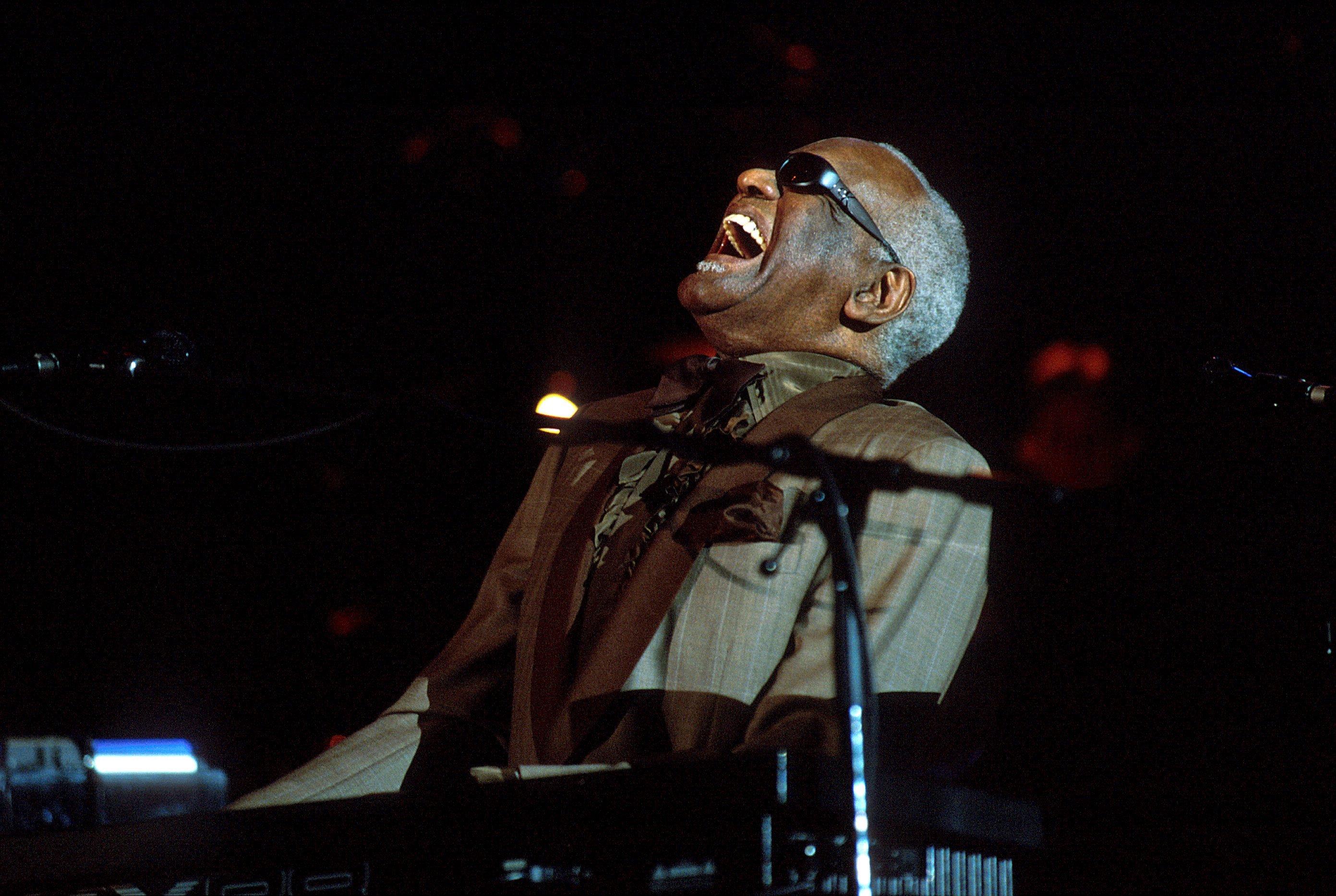
news
8 Country Crossover Artists You Should Know: Ray Charles, The Beastie Boys, Cyndi Lauper & More
Beyoncé's 'Cowboy Carter' is part of a proud lineage of artists, from Ringo Starr to Tina Turner, who have bravely taken a left turn into country's homespun, heart-on-sleeve aesthetic.
When Beyoncé announced her upcoming album, Cowboy Carter, with the drop of two distinctly country tracks, she broke both genre and barriers. Not only did Queen Bey continue to prove she can do just about anything, but she joined a long tradition of country music crossover albums.
Country music is, like all genres, a construct, designed by marketing companies around the advent of widely-disseminated recorded music, to sell albums. But in the roughly 100 intervening years, genre has dictated much about the who and how of music making.
In the racially segregated America of the 1920s, music was no exception. Marketing companies began to distinguish between "race records" (blues, R&B, and gospel) intended for Black audiences and hillbilly music (country and Western), sold to white listeners. The decision still echoes through music genre stereotypes today.
But Black people have always been a part of country music, a message that's gained recognition in recent years — in part because of advocacy work by those like Rhiannon Giddens, who plays banjo and viola on "Texas Hold 'Em," one of two singles Beyoncé released in advance of Cowboy Carter.
And since rigid genre rules' inception, many artists from Lil Nas X to Bruce Springsteen have periodically dabbled in or even crossed over to country music.
In honor of Beyoncé's foray, here are eight times musicians from other genres tried out country music.
Ray Charles — Modern Sounds in Country and Western Music (1962)
In 1962, the soul music pioneer crossed the genre divide to cut a swingin' two-volume, 14-track revue of country and western music.
Part history lesson and part demonstration of Charles' unparalleled musicianship, Modern Sounds in Country and Western Music covers country songs by major country artists of the era, including Hank Williams, Don Gibson, and Eddy Arnold. An instant success, the record topped album sales charts and was Charles' first atop the Billboard Hot 200 charts.
Ringo Starr — Beaucoups of Blues (1970)
The Beatles' drummer loves country music. Ringo Starr cut this album, which sounds like something you'd two-step the night away to at a honky tonk, as his second solo project. He was inspired by pedal steel guitar player and producer Pete Drake, who worked on George Harrison's All Things Must Pass.
With Drake's help, Starr draws out a classic honky tonk sound — pedal steel, country fiddle, and bar room piano — to round out the album.
Beaucoups includes a textbook country heartbreak song, "Fastest Growing Heartache in the West," a bluesy ramblin' man ballad, "$15 Draw," and a surprisingly sweet love song to a sex worker, "Woman Of The Night."
The Pointer Sisters — Fairytale (1974)
Remembered for their R&B hits like "I'm So Excited" and "Jump (For My Love)", the Pointer Sisters dropped "Fairytale," a classic country heartbreak song into the middle of their second studio album, That's A Plenty.
Full of honky tonk pedal steel and fiddle, the track earned the band a GRAMMY award for Country and Western Vocal Performance Group or Duo in 1975, beating out Willie Nelson, Kris Kristofferson, Bobby Bare, and the Statler Brothers; they were the first, and to date, only Black women to receive the award.
The same year the song came out, the Pointer Sisters also became the first Black group to play the Grand Ole Opry, arriving to find a group of protesters holding signs with messages like 'Keep country, country!'
Tina Turner — Tina Turns the Country On! (1974)
Also in 1974, Tina Turner cut her first solo album, Tina Turns the Country On!, while she was still performing with then-husband Ike Turner as the Ike & Tina Turner Revue.
Containing the seeds of the powerful, riveting voice she'd fully let loose in her long solo career after separating from her abusive husband, the album presents a stripped down, mellow Turner.
She covers songs like Kris Kristofferson's "Help Me Make It Through The Night" and Bob Dylan's "Tonight I'll Be Staying Here With You," and delivers a soaring rendition of Dolly Parton's "There Will Always Be Music."
Turner was nominated for a GRAMMY award for the album, but in Best R&B Vocal Performance, Female, category.
The Beastie Boys — Country Mike's Greatest Hits (1999)
This Beastie Boys cut only a few hundred copies (most reports say 300) of this spoof country album — reputedly conceived of as a Christmas present for friends and family, and never officially released.
Presenting the supposed greatest hits of a slightly dodgy, enigmatic character – Country Mike, who shares a name with band member "Mike D" Diamond — the album sounds like vintage steel guitar country. Think Hank Williams and Jimmy Rodgers with a dash of musical oddballs Louden Wainwright III and David Allen Coe's humor and funk.
Country Mike appears just briefly in the liner notes of the band's anthology album, The Sounds of Silence, (which also includes two of the album's tracks: "Railroad Blues" and "Country Mike's Theme"), as part of an alternate universe wherein Mike temporarily lost his memory when he was hit on the head.
"The psychologists told us that if we didn't play along with Mike's fantasy, he could be in grave danger," the notes read. "This song ('Railroad Blues') is one of the many that we made during that tragic period of time."
Cyndi Lauper — Detour (2016)
The "Girls Just Want To Have Fun" singer enjoyed herself thoroughly by deviating from her typical style with 2016's Detour.
Road tripping into country music land, Lauper covered country songs of the 1950s and 1960s, including Marty Robbins' "Begging You," Patsy Montana's "I Want to be a Cowboy's Sweetheart" and Dolly Parton's "Hard Candy Christmas" with guest appearances by Willie Nelson, Alison Krauss, Emmylou Harris, and Vince Gill.
Jaret Ray Reddick — Just Woke Up (2022)
It might be hard to imagine the Bowling for Soup frontman, known for teenage pop-punk angst hits like "Girl all the Bad Guys Want" and "Punk Rock 101" crooning country ballads.
But in 2022, under the name Jaret Ray Reddick, he cut his solo debut, Just Woke Up. Drawing inspiration from Reddick's native Texas, the steel guitar and twang driven album features duets with Uncle Cracker, Cody Canada, Frank Turner, and Stephen Egerton.
Self-effacing and personable as ever, Reddick heads off questions about the viability of his country music with the album's first track, "Way More Country," acknowledging the questions listeners might have:
"I sing in a punk rock band/ And I know every word to that Eminem song "Stan"/ And I've got about a hundred and ten tattoos / But I'm way more country than you."
Bing Crosby — "Pistol Packin' Mama" (Single, 1943)
Legendary crooner of classic Christmas Carols and American standards, Bing Crosby decided to try his hand at country music with his cover of Al Dexter's "Pistol Packin' Mama," the first country song to appear on Billboard's charts.
The song, which tells the story of a man begging his woman not to shoot him when she discovers him out on the town fooling around, has since also been covered by Willie Nelson, Hoyt Axton, and John Prine.
How Beyoncé Is Honoring Black Music History With "Texas Hold Em," 'Renaissance' & More
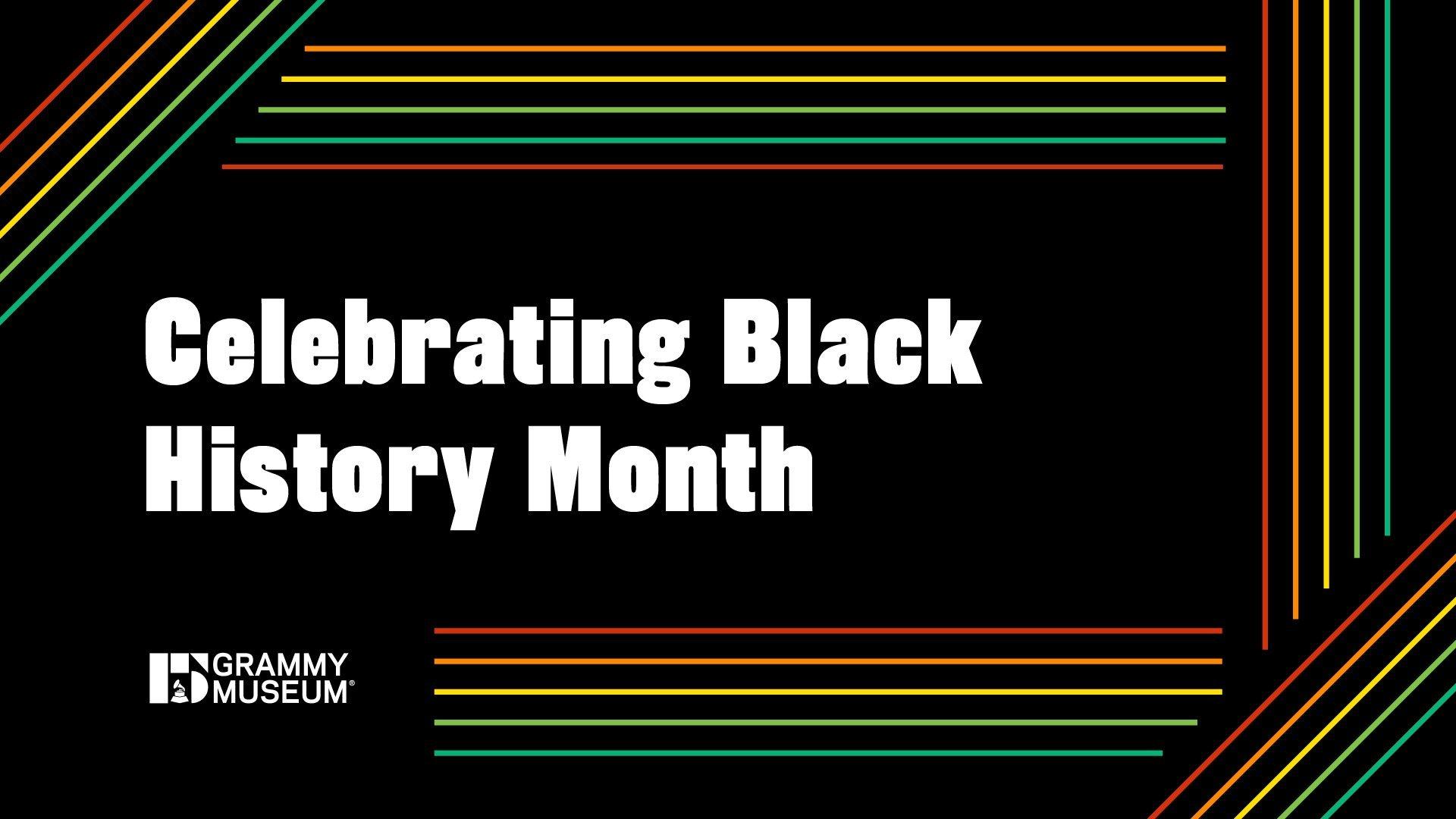
news
The GRAMMY Museum Celebrates Black History Month 2024 With A Series Of Special Programs And Events
Throughout February, the GRAMMY Museum will celebrate the profound legacy and impact of Black music with workshops, screenings, and intimate conversations.
The celebration isn't over after the 2024 GRAMMYs. In recognition of Black History Month, the GRAMMY Museum proudly honors the indelible impact of Black music on America and the fabric of global pop culture.
This programming is a testament to the rich heritage and profound influence of Black artists, whose creativity and resilience have shaped the foundation of American music. Through a series of thoughtfully curated events — including educational workshops, family programs, special screenings, and intimate conversations — the Museum aims to illuminate the vibrant legacy and ongoing evolution of Black music.
From a workshop on the rhythmic storytelling of hip-hop following its 50th anniversary and the soulful echoes of Bill Withers' classics, to the groundbreaking contributions of James Brown and the visionary reimagination of "The Wiz," these GRAMMY Museum programs encapsulate the enduring legacy and dynamic future of Black music.
The GRAMMY Museum invites audiences to delve into the stories, sounds, and souls that have woven Black music into the tapestry of our shared human experience. Through this journey, the Museum and the Recording Academy honor the artists, visionaries, and pioneers whose talents have forever altered the landscape of music and culture.
Read on for additional information on the GRAMMY Museum's month-long tribute that explores, appreciates and celebrates the invaluable contributions of Black music to our world.
Thurs., Feb. 8
History of Hip-Hop Education Workshop
WHAT: In celebration of the 50 years of hip-hop, this workshop examines the unique evolution of Hip Hop from its origin to where the genre is today. Highlighting the golden age of Hip Hop, this lesson will provide students with a greater understanding of the struggles and triumphs of the genre.
WHEN: 11 a.m. – 12:00 p.m.
REGISTER: Click here.
Sat., Feb. 10
Family Time: Grandma’s Hands
WHAT: Join us for a very special family program celebrating the recently released children’s book Grandma’s Hands based on one of Bill Withers’ most beloved songs. Bill’s wife, Marcia, and daughter, Kori, will participate in a book reading, conversation, audience Q&A, and performance, followed by a book signing. The program is free (4 tickets per household.)
WHEN: 11 a.m. – 12:30 p.m.
REGISTER: Click here.
Mon., Feb. 12
Celebrating James Brown: Say It Loud
WHAT: The GRAMMY Museum hosts a special evening on the life and music of the late "Godfather of Soul" James Brown. The program features exclusive clips from A&E's forthcoming documentary James Brown: Say It Loud, produced in association with Polygram Entertainment, Mick Jagger’s Jagged Films and Ahmir “Questlove” Thompson’s Two One Five Entertainment, followed by a conversation with Director Deborah Riley Draper, superstar Producer Jimmy Jam, and some surprises.
WHEN: 7:30 p.m. – 9:00 p.m.
REGISTER: Click here.
Sat., Feb. 17
Backstage Pass: "The Wiz"
WHAT: Presented in partnership with the African American Film Critics Association, join us for an afternoon spotlighting the famed Broadway Musical, "The Wiz," with the producers and creative team responsible for the Broadway bound reboot. The program will feature a lively conversation, followed by an audience Q&A in the Museum’s Clive Davis Theater, and will be hosted by AAFCA President, Gil Robertson, and GRAMMY Museum Education & Community Engagement Manager, Schyler O’Neal. The program is free (four tickets per household).
WHEN: 1 p.m.
REGISTER: Click here.
Thurs., Feb. 22
History of Hip-Hop Education Workshop
WHAT: In celebration of the 50 years of hip-hop, this workshop examines the unique evolution of Hip Hop from its origin to where the genre is today. Highlighting the golden age of Hip Hop, this lesson will provide students with a greater understanding of the struggles and triumphs of the genre.
WHEN: 11 a.m. – 12:00 p.m.
REGISTER: Click here.
Reel To Reel: A Hip Hop Story
WHAT: In conjunction with the GRAMMY Museum's exhibit, Hip-Hop America: The Mixtape Exhibit, the GRAMMY Museum is thrilled to host a special screening of A Hip Hop Story with a post-screening conversation featuring Affion Crockett to follow.
WHEN: 7:00 p.m. – 9:00 p.m.
REGISTER: Click here.
Sun., Feb. 25
Lunar New Year Celebration
WHAT: Join us for a special program celebrating Lunar New Year as we usher in the Year of the Dragon with a performance by the South Coast Chinese Orchestra. The orchestra is from Orange County and uses both traditional Chinese instruments and western string instruments. It is led by Music Director, Jiangli Yu, Conductor, Bin He, and Executive Director, Yulan Chung. The program will take place in the Clive Davis Theater. This program is made possible by the generous support of Preferred Bank. The program is free (four tickets per household).
WHEN: 1:30 p.m.
REGISTER: Click here.
Tues., Feb. 27
A Conversation With Nicole Avant
WHAT: The GRAMMY Museum is thrilled to welcome best-selling author, award-winning film producer, entrepreneur and philanthropist, Ambassador Nicole Avant to the museum’s intimate 200-seat Clive Davis Theater for a conversation moderated by Jimmy Jam about her new memoir Think You’ll Be Happy – Moving Through Grief with Grit, Grace and Gratitude. All ticket buyers will receive a signed copy of the book.
WHEN: 7:30 p.m. – 9:00 p.m.
REGISTER: Click here.
